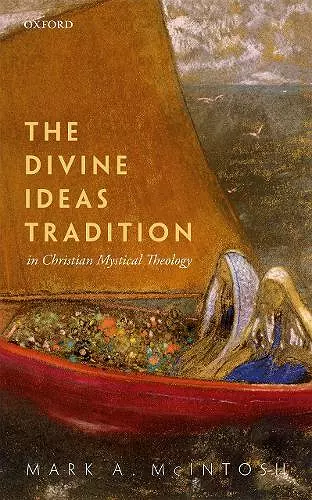The Divine Ideas Tradition in Christian Mystical Theology
Format:Hardback
Publisher:Oxford University Press
Published:4th Mar '21
Currently unavailable, and unfortunately no date known when it will be back

By the time of early modernity, a widely deployed tenet of Christian thought had begun to vanish. The divine ideas tradition, the teaching that all beings have an eternal existence as aspects of God's mind, had functioned across a wide range of central Christian doctrines, providing Christian thinkers and mystical teachers with a powerful theological capacity: to illuminate the Trinitarian ground of all creatures, and to renew the divine truth of all creatures through human contemplation. Already by the time of the Middle Platonists, Plato's forms had been reinterpreted as ideas in the mind of God. Yet that was only the beginning of the transformation of the divine ideas, for Christian belief in God as Trinity and in the incarnation of the Word imbued the divine ideas tradition with a remarkable conceptual agility. The divine ideas teaching allowed mystical theologians to conceive the hidden presence of God in all creatures, and the power of every creature's truth in God to consummate the full dynamic of every creature's calling. The Divine Ideas Tradition in Christian Mystical Theology brings to life the striking role of the divine ideas tradition in the teaching of its central exponents, and also suggests how the divine ideas might constructively inform Christian theology and spirituality today. Especially in an age of global crises, when the truth of the natural environment, of racial injustice, and of public health is denied and disputed for political ends, the divine ideas tradition affords contemporary thinkers a creative and contemplative vision that reveres the deep truth of all beings and seeks their mending and fulfilment.
McIntosh stimulates Reformed theologians to examine and appropriate the overlooked mystical elements in their own tradition. * Derek Bruns, Australian Catholic University, Melbourne, Australia, Journal of Reformed Theology *
The book would be successful as a basis for a graduate seminar, but undergraduates could also benefit from the way that the book does not become overly technical in laying out the notion, history, or significance of thinking about God's ideas. * Fr . James Dominic Rooney, Religious Studies Review *
McIntosh's erudition is impressive and his contribution to theology and philosophy significant. * Julia Lamm, Scottish Journal of Theology *
For McIntosh, immersion in the theological tradition concerning the "divine ideas" was not merely an academic exercise, but a matter of burning actuality. * Robert P. Imbelli, Commonweal Magazine *
In The Divine Ideas, McIntosh marshals an array of Christian thinkers— from Origen and Augustine, through Maximus the Confessor and John Scotus Eriugena, to Aquinas and Bonaventure * Robert P. Imbelli, Commonweal Magazine *
McIntosh makes absorbing Christian theological arguments rooted in the so-called divine ideas tradition, and he makes a powerful bid for the relevance of this tradition. * G. J. Reece, CHOICE Connect, Vol. 59 No. 8 *
This is a stellar essay on a neglected topic....McIntosh leaves behind a significant theological and pastoral legacy and this final book proves to be a fitting capstone to his life and work. * Matthew A. Rothaus Moser, International Journal of Systematic Theology *
ISBN: 9780199580811
Dimensions: 220mm x 140mm x 20mm
Weight: 392g
232 pages